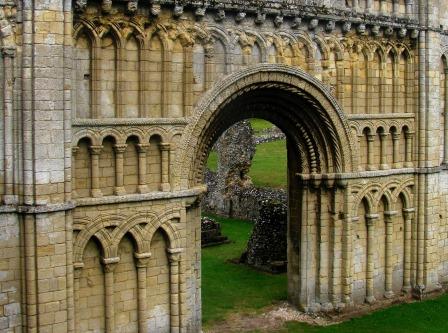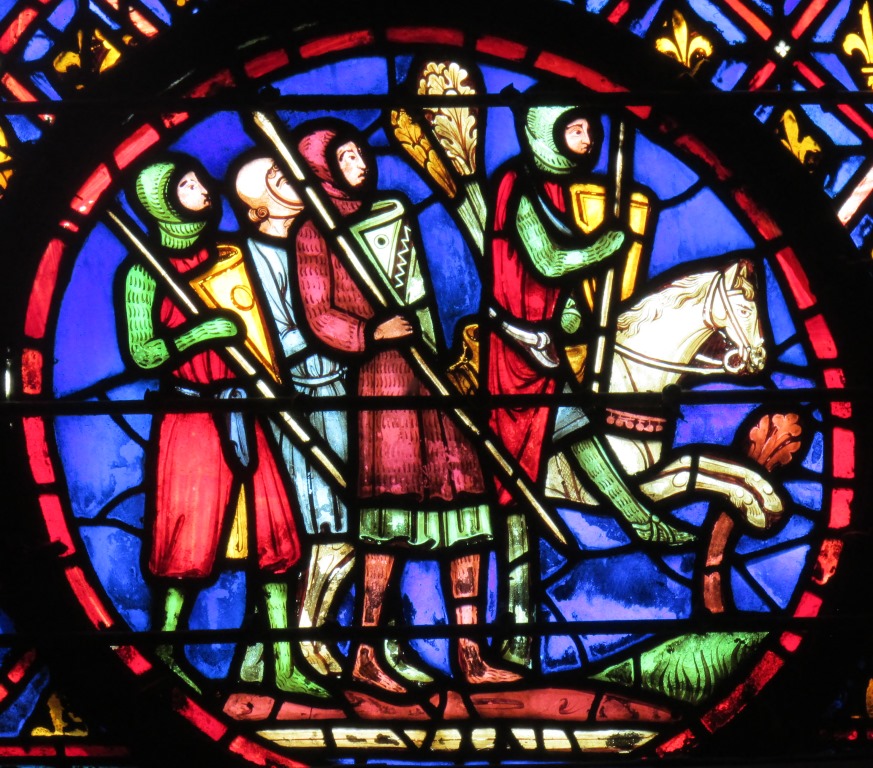| |

|
| |
In conjunction with UNC’s Medieval and Early Modern Studies [MEMS] program, we are holding two events to complement the conference program. All conference delegates arriving on Thursday are warmly invited to attend. Both events are in Hamilton Hall, which is on the main UNC campus within easy walking distance of the principal conference venue. (A campus map is to be found on the back cover of the conference pack.)
|
3:00 start
|
Michael Staunton (University College, Dublin) will lead a seminar for graduate students on the subject of medieval historical writing. Specifically, the seminar will discuss various of the issues raised by one of the chapters in Peter Raleigh’s (UNC Chapel Hill) forthcoming doctoral dissertation on historical writing in England in the late twelfth and early thirteenth centuries. Details of how this chapter will be circulated in advance will be supplied in due course. The seminar will be held in Hamilton 569.
|
| 5:30-7:00 |
Katherine Smith (University of Puget Sound) will deliver a lecture in MEMS’s Dorothy Ford Wiley Crossroad Lecture series. The title of her paper is “The Road to Babylon: The First Crusade as Moral Performance.” All those attending the conference are warmly invited to come to this lecture, which will also be held in Hamilton 569.
|
|
|

|
|
8:30-11:30
|
Business Meeting for Officers and Councilors of the Society (Incubator Room)
|
|
9:15
|
Registration Opens
|
|
10:00-11:30
|
Session 1 — New Research Forum
Presiding: Michael Staunton, University College, Dublin
Mary Blanchard, Ave Maria University
Richard Daines, University of East Anglia
Meghan Woolley, Duke University
|
|
12:00-12:15
|
Welcome
|
|
|
|
12:15-1:45
|
Session 2 — The Study of the Bible in the Twelfth Century : New Perspectives
Chair: Jennifer Paxton, Catholic University of America
“Love of Learning and a Desire for Bite-sized Wisdom: Richard of Préaux’s Commentary on Proverbs and the Challenges of Monastic Exegesis in the Early Twelfth Century”
♦ William North, Carleton College
“The Useful Priest: Pastoral Duty and Behavior in Ralph of Laon’s Commentaries on Timothy and Titus”
♦ Suzanne LaVere, Purdue University
“‘Courtly Exegesis’? Power and Authority in Ralph Niger’s Old Testament Commentaries”
♦ John Cotts, Whitman College
|
1:45-1:55
|
Break
|
|
2:00-3:30
|
Session 3 —Re-thinking Aristocratic Property and Wealth in Capetian France, 987-1328
Chair: Jehangir Malegam, Duke University
“Re-thinking Aristocratic Property in the Loire Valley Around the Year 1000”
♦ Niall Ó Súilleabháin, Trinity College, Dublin
“Building a Holy Patrimony: The Nuns of St. Avit and Their Property”
♦ Amy Livingstone, Ball State University
“‘Money, Money, Money’: Aristocratic Debt and Marital Strategy in Thirteenth-Century Northern Burgundy”
♦ Charlotte Crouch, University of Reading
|
|
3:30-3:55
|
Refreshments
|
|
4:00-5:30
|
Session 4 — The Crusader World
Chair : Brett Whalen, University of North Carolina, Chapel Hill
“Narrative and Community in the Carmen in victoriam Pisanorum
♦ Daniel Morgan, University of North Carolina, Chapel Hill
“Northern Crusaders and the Iberian Frontier 1147-1217”
♦ Lucas Villegas-Aristizábal, Queen’s University, Kingston
“Angevins, Capetians, Mamluks, and Hafsids: The Tunis Crusade of 1270
♦ Michael Lower, University of Minnesota
|
|
5:30-5:45
|
Break
|
|
5:50-6:50
|
Featured Speaker: Theodore Evergates, McDaniel College
♦♦♦♦
“The War Memoirs of Geoffroy of Villehardouin”
Presiding: Marcus Bull, University of North Carolina, Chapel Hill
|
Evening
|
(See our Local Info Page for the Insider's Guide to dining around town.)
|
|
|

|
|
8:45-10:15
|
Session 5 —Making One's Mark: Inscribed Lives in the British Isles
Chair: Katherine Smith, University of Puget Sound
“Graffiti as Gaming: Vikings at Play in the Orkney Islands”
♦ Julie Mell, North Carolina State University
“Writing of History in Gaelic Ireland: The Case of Holy Trinity Abbey”
♦ Kathryn O'Neill, Harvard University
|
|
10:15-10:45
|
Refreshments
|
|
10:45-12:15
|
Session 6 — Archaeologies of the Norman Conquest: Material Culture and Society in the Eleventh and Twelfth Centuries
Chair: Robin Fleming, Boston College
“New Agendas, New Narratives: Can Archaeology Change the Way We Think About ‘1066 and All That’”?
♦ Aleksandra McClain, University of York
“All Change? 1066 and the Normanization of the English Landscape: Archaeological Perspectives”
♦ Oliver Creighton, University of Exeter
“Animals and Identity in the Anglo-Norman World”
♦ Naomi Sykes, University of Exeter
“Rethinking the Impact of the Norman Conquest Using Archaeological Evidence of Diet and Food Culture”
♦ Elizabeth Craig-Atkins, University of Sheffield
|
|
12:15-1:45
|
Lunch
|
|
1:45-2:45
|
Featured Speaker: Alice Rio, King's College, London
♦♦♦♦
“Underwhelming Miracles of the Carolingian Period”
Presiding: Nicholas Paul, Fordham University
|
|
2:45-3:00
|
Break
|
|
3:00-4:30
|
Session 7 — Lay Religiosity in the Capetian Realm
Chair: Myra Bom, Royal Holloway, University of London
“Saints and Courtiers: The Piety of the Montfort and Montmorency Families and Their Relationship with Blanche of Castile and the Capetian Court”
♦ Lindy Grant, University of Reading
“A Warrior’s Relics Reconstructed: Philip of Alsace’s Gifts to Clairvaux (1191)”
♦ Anne Lester, University of Colorado Boulder
“Building Pastoral Networks in Medieval Paris”
♦ Tanya Stabler Miller, Loyola University-Chicago
|
|
4:30-5:00
|
Refreshments
|
|
5:00-6:00
|
The C. Warren Hollister Lecture
William C. Jordan, Princeton University
♦♦♦♦
“Rustics Petitioning to Parlement in the Thirteenth Century: A Case Study”
Presiding: Robert Berkhofer, Western Michigan University
|
|
6:10-7:20
|
Reception: Incubator Room, Hyde Hall
|
|
Evening
|
(See our Local Info Page for the Insider's Guide to dining around town.)
|
|
|

(Smith Room, First Floor, Hampton Inn and Suites, Carrboro)
|
|
9:00-10:00
|
Session 8 — Domination and Devotion
Chair: Steven Isaac, Longwood University
“The Bilateral Ordeal in Ottonian Justice”
♦ Laura Wangerin, Seton Hall University
“In His Name: Religion as Administrative Strategy in Thirteenth-Century Champagne”
♦ Jillian Bjerke, University of Colorado Boulder
|
|
10:00-10:15
|
Break
|
|
10:15-11:15
|
Session 9 — Forging the Past in Medieval Britain and France
Chair: Kathryn Salzer, Pennsylvania State University
“‘Ystoria non fabula’: Remembering Forged Pasts at Saint Peter’s, Ghent”
♦ Robert Berkhofer, Western Michigan University
“Forging Exemption in Eleventh-Century France: Fleury from Abbo to William (997-1072)”
♦ Levi Roach, University of Exeter
“Forging Inheritance in Late Twelfth- and Early Thirteenth-Century Scotland”
♦ Alice Taylor, King’s College, London
|
|
11:15-11:30
|
Break
|
|
11:30-1:00
|
Session 10 — Time, History, and Identity
Chair:Richard Barton, University of North Carolina, Greensboro
“The Representation of Time in William of Malmesbury’s Historia Novella”
♦ Caitlin Naylor, Aberystwyth University
“Competing Visions of the Past: Norman Identities in the Thirteenth-Century Chronique de Normandie”
♦ Alex Hurlow, University of Manchester
|
|
|
|
A gentle reminder for those giving papers:
The point of giving a talk is as much about the questions and the conversation that arise during the Q&A period, as it is about the paper itself. Because of this, you are asked to stick closely to your allotted paper-giving time of 20 minutes (or 15 minutes in some cases). A 20-minute paper is generally a 10-page, 12-point-font typescript. Please be courteous to your fellow panelists and come prepared to give a paper of the prescribed length. Panel Chairs will be instructed (with, of course, a couple of minutes' grace) to keep their panelists to time. We would all like to hear your conclusions, but will be robbed of the pleasure if you have been dragged off the podium by your Chair.
For those using A/V:
There is standard A/V provision in the Conference Room, Hyde Hall (Friday and Saturday) and Smith Room, Hampton Inn & Suites (Sunday) that meets routine conference needs – for example, the giving of PowerPoint presentations. If you have particular questions or requests, please contact Conference Director Marcus Bull.
Handouts:
You will need to bring copies of any handout with you to the conference. Eighty copies should suffice.
|





